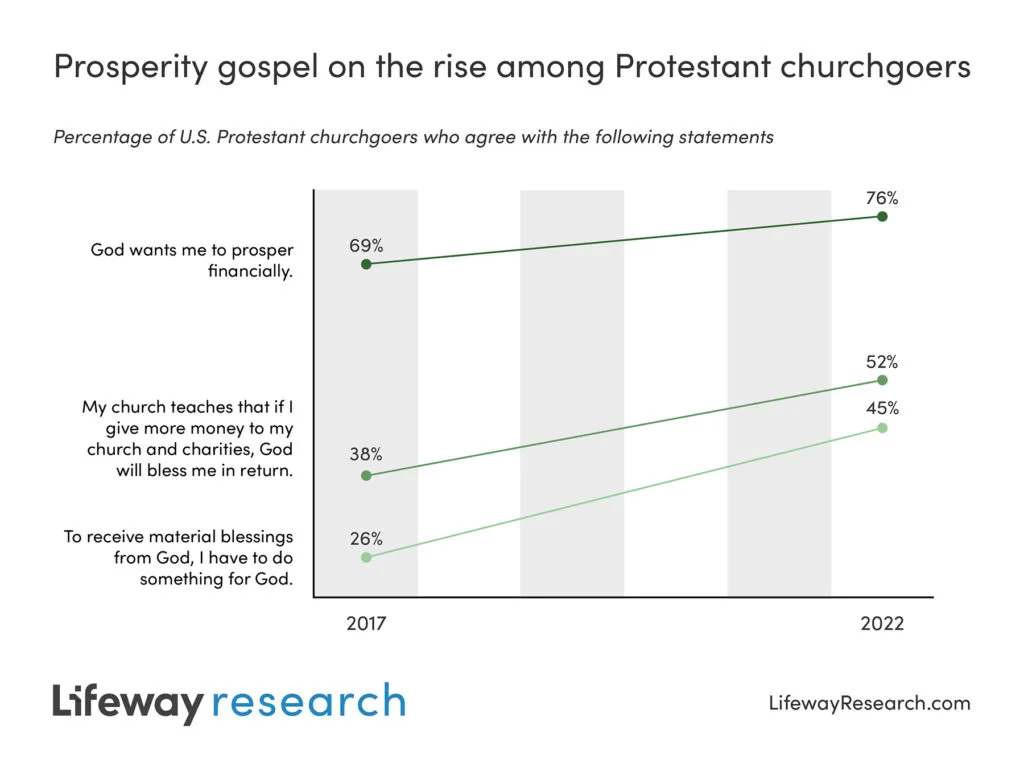
BRENTWOOD, Tenn. (BP) – Financial prosperity is a goal for many Americans, and most believe it’s God’s plan for them too but that they need to give a little more to ensure that blessing.
According to a study from Lifeway Research, 52 percent of American Protestant churchgoers say their church teaches God will bless them if they give more money to their church and charities, with 24 percent strongly agreeing. This is up from 38 percent of churchgoers who agreed in a 2017 Lifeway Research study.

Additionally, churchgoers are more likely today than in 2017 to believe God wants them to prosper financially (76 percent v. 69 percent) and that they have to do something for God in order to receive material blessings from Him (45 percent v. 26 percent).
Today, 3 in 4 churchgoers (76 percent) believe God wants them to prosper financially, including 43 percent who strongly agree. Fewer (45 percent) believe they have to do something for Him in order to receive material blessings from God, with 21 percent strongly agreeing.
“In the last five years, far more churchgoers are reflecting prosperity gospel teachings, including the heretical belief that material blessings are earned from God,” said Scott McConnell, executive director of Lifeway Research. “It is possible the financial hits people have taken from inflation and the pandemic have triggered feelings of guilt for not serving God more. But Scripture does not teach that kind of direct connection.”
Identifying the root of the wrong belief
As people interact with the world around them, their beliefs about the world and their place in it stem from their understanding (or misunderstanding) of the character of God. And most churchgoers believe God wants them to prosper financially.
This belief is especially prevalent among both the youngest and least educated churchgoers. Churchgoers ages 18-34 (81 percent) and 35-49 (85 percent) are among the most likely to say God wants them to prosper financially. Furthermore, those who are high school graduates or less (81 percent) or have some college education (80 percent) are more likely than those with a bachelor’s (67 percent) or graduate degree (65 percent) to hold this belief.
Belief that God wants people to prosper financially is also more common in some religious settings than others. Methodist (93 percent) and Restorationist movement (88 percent) churchgoers are among the most likely to hold this belief. And those with evangelical beliefs are more likely than those without such beliefs to agree (80 percent v. 74 percent).
“Pursuing holiness was never designed by God to be a plan for financial riches,” McConnell said. “The size of one’s finances is not the measure of anyone’s service to God nor relationship with Him.”
Selling a false gospel at church
As more churchgoers affirm prosperity gospel beliefs, younger churchgoers – those 18-34 (63 percent) and 35-49 (66 percent) – are more likely than older churchgoers – those 50-64 (53 percent) and over 65 (31 percent) – to affirm their church teaches that if they give more money to the church and charities, God will bless them.
“This research does not rule out the possibility that biblical teachings were poorly heard by more young adults, but they definitely have experienced a lack of clear biblical teaching on the reason for generosity,” McConnell said.
African American churchgoers are the most likely to say their church teaches that if they give more money to the church and charities, God will bless them in return (71 percent). And those who attend worship services one to three times a month are more likely to say the same than those who attend at least four times a month (57 percent v. 49 percent).
Churchgoers without evangelical beliefs are more likely than those with such beliefs to say their church teaches that if they give more money, God will bless them (55 percent v. 48 percent). The opposite was true five years ago when 41 percent of evangelicals and 35 percent of non-evangelicals agreed.
Denominationally, Methodist (85 percent) and Restorationist movement (71 percent) churchgoers are among the most likely to agree their church teaches God will bless them if they give more money.
Giving a little to get a little
Of the three beliefs surveyed, churchgoers are least likely to believe they have to do something for God in order to receive material blessings from Him. Still, like the others, this belief is most prevalent among younger churchgoers. Those 18-34 (65 percent) and 35-49 (58 percent) are more likely than those 50-64 (43 percent) and over 65 (22 percent) to hold this belief. In 2017, churchgoers ages 35-49 were the least likely age group to agree (19 percent).
“Scripture teaches God gives good gifts to those He chooses,” McConnell said. Despite Romans 11:35-36a saying “And who has ever given to God, that he should be repaid? For from him and through him and to him are all things” (CSB), McConnell noted, “Large numbers of young adults attending church regularly still believe their good deeds can tilt God’s gifts in their direction.”
Those who are high school graduates or less (50 percent) or have some college education (48 percent) are more likely than those with a bachelor’s degree (38 percent) or a graduate degree (30 percent) to agree. And African Americans are the most likely to agree (65 percent).
Among regular church attenders, those who attend a worship service least often (one to three times a month) are more likely than those who attend at least four times a month to say they have to do something for God in order to receive material blessings from Him (49 percent v. 42 percent). Methodist (85 percent) and Restorationist movement (68 percent) churchgoers are once again the most likely to hold this belief. And those without evangelical beliefs are more likely than those with such beliefs to agree (50 percent v. 37 percent).
For more information, view the complete report and visit LifewayResearch.com.
Methodology
The online survey of 1,002 American Protestant churchgoers was conducted Sept. 19-29, 2022, using a national pre-recruited panel. Respondents were screened to include those who identified as Protestant/non-denominational and attend religious services at least once a month. Quotas and slight weights were used to balance gender, age, region, ethnicity, education, and religion to reflect the population more accurately. The completed sample is 1,002 surveys. The sample provides 95 percent confidence that the sampling error does not exceed plus or minus 3.3 percent. This margin of error accounts for the effect of weighting. Margins of error are higher in sub-groups.
Comparisons are made to an online survey conducted by Lifeway Research August 22-30, 2017, of 1,010 Protestants who attend religious services at least once a month.
“Evangelical beliefs”are defined using the National Association of Evangelicals and Lifeway Research evangelical beliefs research definition based on respondent beliefs. Respondents are asked their level of agreement with four separate statements using a four-point, forced-choice scale (strongly agree, somewhat agree, somewhat disagree, strongly disagree). Those who strongly agree with all four statements are categorized as having evangelical beliefs.
- The Bible is the highest authority for what I believe.
- It is very important for me personally to encourage non-Christians to trust Jesus Christ as their Savior.
- Jesus Christ’s death on the cross is the only sacrifice that could remove the penalty of my sin.
- Only those who trust in Jesus Christ alone as their Savior receive God’s free gift of eternal salvation.
-30-
Marissa Postell Sullivan is a writer for Lifeway Christian Resources.





